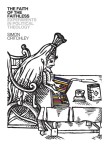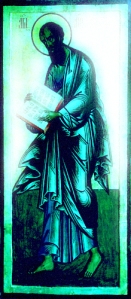 Critchley, Simon. 2012. The Faith of the Faithless: experiments in political theology. London: Verso Books.
Critchley, Simon. 2012. The Faith of the Faithless: experiments in political theology. London: Verso Books.
Under the encouragement of a friend, I’ve spent the last six months reading a lot of Žižek. This has been simultaneously pleasurable and infuriating because while I love Žižek’s style (and even agree with him on many issues), I find the politics implied by his more recent turn to Lenin and praise of “divine violence” to be profoundly troubling. (I also radically disagree with Žižek’s analysis of religion, but I’ll save that for a later blog post). My interest was piqued when Žižek condemned the British born, New School-based, political philosopher Simon Critchley, stating that Critchley’s work was “an almost perfect embodiment of the position to which my work is absolutely opposed.” When I then heard that Critchley had made a recent foray into Religious Studies that was getting a lot of attention, I knew that I had to add Faith of the Faithless to my reading list. Having done so, and having cajoled friends and colleagues to read and discuss it with me, I am now in a position to report back some observations.
At the most basic level, Faith of the Faithless is premised on Carl Schmitt’s claim that all significant modern political concepts are really secularized theological concepts (103). In Schmitt’s day an older theory of secularization held sway and many scholars likely imagined that even these theological remainders would be purged over the course of modernity. But in today’s so-called “post-secular age” it appears that instead of increased differentiation, politics and religion are becoming even more deeply intertwined. As Critchley puts it:
“Somehow we seem to have passed from a secular age, which we were ceaselessly told was post-metaphysical, to a new situation in which political action seems to flow directly from metaphysical conflict.” (8)
In effect, Critchley considers all politics to be religious. He suggests that theological concepts are so heavily intertwined with political concepts that in order to have a functioning politics, politics must escape itself by articulating a relation to the transcendent. As a committed atheist, this puts Critchley in a bit of a bind, which he tries to solve by constructing a kind of atheistic political theology. Basically, Faith of the Faithless is an attempt to think about how to organize a new Left politics in the face of the Death of God (or the confrontation with relativistic nihilism). Interestingly Critchley tries to conjure this new political community not by drawing attention to society’s injustices (classic liberal guilt), but through appropriating an explicitly theological language.
Critchley takes his inspiration from Oscar Wilde’s De Profundis, in which Wilde writes: “When I think of religion at all, I feel as if I would like to found an order for those who cannot believe: the Confraternity of the Faithless.” Critchley then sets out to describe what this faith of the faithless might be. In other words, he tries to describe the essence of a possible secular answer to Christianity.
To give a bit of a spoiler, the core of this Faithless Faith turns out to be a community focused on something Critchley refers to as fidelity to the infinite demand. This should clue us into the fact that Faith of the Faithless is in many ways an extension of the ethical reflections that Critchley articulated in a previous work, Infinitely Demanding: Ethics of Commitment, Politics of Resistance (2007). The task he set for himself in the earlier work was how to motivate action in a contemporary liberal society without succumbing to nihilism, in other words: how to find a basis for binding ourselves to the good when we have lost our theological commitments and when, philosophically, everything has become in some sense meaningless. Critchley’s attempted solution (via an odd combination of Levinas and Badiou) was to articulate a foundation for ethics rooted in the infinite responsibility of an ethical demand. Basically, in the encounter with the dejected (Other) we are called upon to work for the good in the very moment we recognize our limitedness. I’ve only skimmed Infinitely Demanding so I don’t want to pass judgment on it here, but Faith of the Faithless seems to be an attempt to conjure up a kind of political community that would embody this kind of morality. It also seems to be inspired in good part as a response to Critchley’s peers (and critics).
In Faith of the Faithless, Critchley makes his argument through chapters focused on a close reading of Rousseau’s idea of Civil Religion (Chapter 2), exploring secular versions of original sin (Chapter 3), on picking fights with Critchley’s contemporaries (John Gray in Chapter 3 and Žižek in Chapter 5). Along the way there are fairly superficial discussions of Carl Schmitt, Kierkegaard, Marguerite Porete, and the Movement of the Free Spirit, and what is a effectively Critchley’s friendly shout-out to Badiou. The chapters that will likely prove most interesting (if ultimately unsatisfying) to scholars of religion are Chapters 2 and 4.
 Chapter 2, “The Catechism of the Citizen” is probably the work’s strongest chapter. Its focus is a close reading of Rousseau’s The Social Contract, reconstructed in terms of the works décalages (literally “gaps” or “shifts” but more accurately “discrepancies”). This is a move Critchley is getting from Althusser’s famous lectures on the same text, which traced the chain of discrepancies Rousseau adopted and then masked in turn. In contrast to Althusser, what Critchley argues is that by comparing The Social Contract to its earlier form in the so-called Geneva Manuscript, we can see that Rousseau is struggling to formulate a politics that equates sovereignty and authority with the people. But that while the people have the self-authorizing power to create the law, the people also have to be able to believe in the authority of the law as something outside themselves (otherwise they might be constantly inclined to manipulate it for selfish rather than communal purposes). Rousseau realized that he was stuck in a bind because it is hard for popular law to have that kind of authority, so he first postulated a kind of divine legislator and then, in Critchley’s account, Rousseau was forced to turn to the concept of Civil Religion as a way to produce a kind of love for the law that the state requires (if only Rousseau had really read his Confucius). While Rouesseau’s Civil Religion was basically a Protestantism abbreviated into a politicized Deism, Critchley calls for an alternate Civil Religion for the Anglo-American context, rooted in something other than a deity.
Chapter 2, “The Catechism of the Citizen” is probably the work’s strongest chapter. Its focus is a close reading of Rousseau’s The Social Contract, reconstructed in terms of the works décalages (literally “gaps” or “shifts” but more accurately “discrepancies”). This is a move Critchley is getting from Althusser’s famous lectures on the same text, which traced the chain of discrepancies Rousseau adopted and then masked in turn. In contrast to Althusser, what Critchley argues is that by comparing The Social Contract to its earlier form in the so-called Geneva Manuscript, we can see that Rousseau is struggling to formulate a politics that equates sovereignty and authority with the people. But that while the people have the self-authorizing power to create the law, the people also have to be able to believe in the authority of the law as something outside themselves (otherwise they might be constantly inclined to manipulate it for selfish rather than communal purposes). Rousseau realized that he was stuck in a bind because it is hard for popular law to have that kind of authority, so he first postulated a kind of divine legislator and then, in Critchley’s account, Rousseau was forced to turn to the concept of Civil Religion as a way to produce a kind of love for the law that the state requires (if only Rousseau had really read his Confucius). While Rouesseau’s Civil Religion was basically a Protestantism abbreviated into a politicized Deism, Critchley calls for an alternate Civil Religion for the Anglo-American context, rooted in something other than a deity.
***
Chapter 4, “You Are Not Your Own: On the Nature of Faith” is focused on the return of the Apostle Paul in Continental philosophy. For those unfamiliar with this, starting in the early 1990s, Paul started to be read as a philosophical figure: in German, Jacob Taubes (1993); in French, Alan Badiou (1997); in Slovenian, Žižek (1998 and in English in 2009; 2010) and in Italian, Giorgio Agamben (2000)(see list below). Although Taubes was otherwise a scholar of religion, these other commentators were variously attempting to appropriate Paul to do work in philosophy. When Critchley called for a reappraisal of the turn to Paul, I was instantly onboard as this movement is definitely in need of an explanation.
In Chapter 4, Critchley seems to have set himself two main tasks: first, to assert his own version of a secular Pauline theology, and second, to displace other contemporary readings of Paul that might stand in the way of this interpretation. Critchley’s version of Paul is a kind of Ranciere-esque ‘saint of the dejected,’ (157) calling on human beings to embrace their solidarity through their own brokenness. As Critchley puts it:
“God has chosen the things that are not in order to bring to nothing the things that are. This is why we must become the filth of the world, the scum of the earth.” (178).
Having recognized in ourselves this kind of debasement in front of God and the Law, Critchley says that we must express this intention through faith. But Critchley chooses to understand faith not as belief and trust directed toward a Christian God, but as a kind of declarative act:
“The idea I want to propose here, and then develop more carefully through a reading of Heidegger, is that of faith as a declarative act, as an enactment, a performative that proclaims…Faith is an announcement that enacts, a proclamation that brings the subject of faith into being…faith is an enactment in relation to a calling.” (161)
The calling is, of course, the infinite demand of Critchley’s previous work, now put into the mouth of Paul. However, this leads to the question about whether or not this proclamation of faith is meant to be trust in something that is truthfully believed to be the case. Critchley’s answer is basically no:
“Truth is conceived as what, in a rather nicely antiquated English, can be called ‘troth-plight,’ the faithful act of pledging or proclaiming.” (165)
In effect Critchley’s faith is directed at a political fiction that gives life to a particular community. This is a pretty strained reading of faith, but is not without precedents.
In constructing his Paul, Critchley conjures up various contemporary versions of Paul in order to foreclose certain readings of the figure. Critchley’s strategy for doing so is in effect to accuse Agamben, Badiou, and Heidegger of being “Crypto-Marcionites.” This may take a moment of explanation for readers not versed in early Christian history. In brief, Marcion of Sinope (c.85-c.160) was an influential early Christian leader, whose work has only been preserved in the writings of his enemies (esp. Tertullian, Adversus Marcionem). As far as we can ascertain (see Sebastian Moll, The Arch-Heretic Marcion), Marcion was one of the first figures to formulate a Christian cannon. In effect we could think of Marcion as the father of the New Testament. But his version of the New Testament was radically different from what we know today because Marcion included only ten of Paul’s letters and only one gospel (a modified Luke) in his version of the Christian proto-bible. For Marcion, Paul was the only true apostle (196). Moreover, the Hebrew Bible was totally excluded as a separate work. Why? Because again, as far as we can, tell Marcion believed that the loving God of Jesus (understood via Paul) was literally a different deity from the vengeful God of the Old Testament. Marcion hereby proposed a dualism in which the world of form or matter is ruled over by an ‘Evil Creator God,’ while liberation can be found in the spiritual promise of an ‘Alien God’ (believed to have manifested for the first time in the material plane in the form of Jesus). While Marcionites were a successful possible form of Christianity for perhaps as much as 300 years, they were ultimately expunged as a heresy and the term Marcionism lived on only as a kind of short hand for anti-Semitism.
What does this have to do with Agamben? Critchley argues that, despite protestations to the contrary, Agamben and Heidegger (and, to a lesser degree, Badiou) are really on the same page in regard to Paul. But that “the way in which certain ultra-Paulinism asserts itself in figures like Agamben, Heidegger, and Badiou that might lead one to conclude that the contemporary return to Paul is really a return to Marcion.” (195) In particular, Critchley argues that the turn to Paul is really an antinomian rejection of the Law (and therefore a reject of the Hebrew Bible). This reminds Critchley of Marcion, as after all, Paul was the center of Marcion’s world. So in taking Paul without either an extended Hebrew Bible or Christian tradition, Critchley suggests philosophers have in effect reenacted Marcion’s theological moves. Critchley makes the case for this reading of Marcion in a very strange way, because he does so through the work of Adolf von Harnack (1851-1930), a German Lutheran theologian, who famously described Marcion as a kind of proto-Luther. That Critchley has to turn to a work authored in 1923 is a bit strange, but it allows him to equate uber-Protestantism with Marcionism. In doing so, Critchley is able to connect an unspoken charge of Christian anti-Semitism with the turn to an antinomian Paul. This works for Critchley because he wants to extract Paul from what he thinks of as a kind “mystical anarchism.”
I think Critchley’s chain of associations is completely misguided. As far as we can reconstruct, Marcion was famously an ascetic: baptism only for the celibate and all that. He wasn’t antinomian in the modern sense. Marcion wasn’t against the LAW, as such, just against what he took to be the Jewish Law. (Even Harnack suggests that Marcion argued for the “Law of Love.”) Critchley seems to have bought into Harnack’s idea of Marcion as a proto-Luther. So again, all Critchley gets by showing that these folks are Cypto-Marcionites is to say they are Crypto-Protestants.
While I think it is fair to say that much of the turn to Paul is motivated by a Protestant impulse, I would argue that the turn to Paul is also really the turn to Muhammad, but cannot name itself as such. I would argue that it is a kind of (extremely) Crypto-Orientalized-Islamism, but I’ll have to put that in a later blog entry. Regardless, I don’t think Critchley adds very much to either the turn to Paul or its explanation (except in so far as he links things up to a Protestant impulse and puts Heidegger back in the conversation).
***
To conclude, what goes by “theory” these days is often read for its political implications (often to the detriment of other discussions of a text’s scholarly merit) and while I often push back against this reduction to the political as a main standard by which to judge a work, in so far as Faith of the Faithless is a political project I think it is fair to read it in these terms.
The fundamental mistake of Critchley’s project is its basic conceit—that the best way for secular folks to respond to the return of religion in politics is to mask or reformulate secular values in Protestant language. First, this is troubling because it exactly recaps the rightwing critique; conservative Christian leaders have repeatedly accused liberal Protestantism of being nothing more than a mask for the secular. This allows evangelicals to rhetorically capture Christianity (even as they are modifying it to make room for capitalism) and to challenge the authenticity of Liberal Protestantism.
Second, and more importantly, Critchley’s project demonstrates a failure to look outside the terms of a secularized Protestant politics. The field of religious studies has spent the last half-century tracking the Protestant presuppositions behind the concept of religion. It has been argued, and I think in some ways rightly, that the concept of religion itself is basically Protestant in presupposition. The focus on a community constructed by faith focused on God (or the transcendent) turns out to be only a Protestant conception of Religion that doesn’t apply to Catholicism or Judaism, much less to anything out of the cultural horizon of the Occident. If this weren’t enough, folks like Robert Bellah already gestured at the Protestant character of American Civil Religion in 1967, and Talal Asad, building on this insight (and others), has spent a long time arguing for the essentially Protestant character of secularization. In using faith as its central term, Critchley’s Faith of the Faithless is just retreading the old path of a Euro-American secular that transformed Protestant categories into universals. So in this way Critchley’s suggestions are a step backward.
In summary, what interested me about this book in the first place was its confrontation with some of the major themes in Religious Studies’ scattered field(s): how to understand the “postsecular” (in Critchley’s terms “metamorphoses of sacralization”) and how to appraise the contemporary relationship between religion and politics. The other things that drew my attention to Faith of the Faithless were the fight with Žižek and the attempt to reassess the turn to Paul. I even liked something about its political aims. But I found that despite its promise, the work does not fill its potential. The reading of Rousseau is nuanced and interesting, the criticism of Žižek is amusing and well directed, but much of the rest of the book is scattered and superficial. I would summarize it by concluding: Critchley opens up excellent questions and points at real problems, which is commendable and makes the work worth reading, but his answers are ultimately disappointing.
Thanks to Christian Thorne and the collective insights of the Religion Department Theory and Method Group at Williams College.
——————-
List of the main books described as part of the turn to Paul in contemporary theory:
Giorgio Agamben. Il tempo che resta. Un commento alla Lettera ai Romani (2000). Trans. Patricia Dailey as The Time that Remains: A Commentary on the Letter to the Romans (2005).
Alain Badiou. Saint Paul. La fondation de l’universalisme (1997) Trans. Ray Brassier as Saint Paul: The Foundation of Universalism (2003)
Daniel Boyarin.A Radical Jew: Paul and the Politics of Identity, (1994).
Jacob Taubes. Die politische Theologie des Paulus. (1987) Trans. Aleida Assmann as The Political Theology of Paul (2004)
Slavoj Žižek. Alain Badiou, Sveti Pavel: Utemeljitev Univerzalnosti (Alain Badiou as a Reader of Saint Paul) (1998)
Slavoj Žižek.The Monstrosity of Christ: Paradox or Dialectic? (2009)
Slavoj Žižek. Paul’s New Moment: Continental Philosophy and the Future of Christian Theology (with Creston Davis and John Milbank) (2010)



Fun post. Curious- can you compare chapter two to the communitarian impulse throughout Robert Bellah? Does Critchley mention him at all?